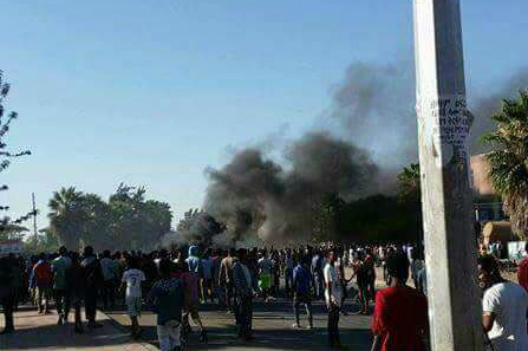After overseeing the release on February 13 and 14 of thousands of political challengers to the regime, Ethiopian prime minister Hailemariam Desalegn has resigned amid continuing protests that potentially threaten the survival of the government. (For detailed analysis of those events, read this: https://buff.ly/2GeB15y )
Though in the midst of crisis, Ethiopia is enjoying a moment of triumph and optimism. The protest movement that has forced Hailemariam’s resignation, though marked by occasional violence and the destruction of property, have been remarkably peaceful constrained, given the many hundreds of thousands who have marched and the brutality of the Ethiopian army’s attempts to quell them. They have also succeeded beyond anyone’s expectation: not since the end of the apartheid period in South Africa has any autocratic regime voluntarily agreed to release thousands of political opponents and to open civic space. But will it last?
Prime Minister Hailemariam has cast his resignation as a peace offering to the protestors and has promised dramatic reforms. But he has long been despised by hardliners within Ethiopia’s ruling elite, which is composed of members of the tiny Tigrean ethnic group and their closest allies. These hardliners have insulted the prime minister so viciously in cabinet meetings that he has reportedly sometimes been reduced to tears. These hardliners have long wanted to oust Hailemariam in order to replace him with someone more forceful, and preferably with a member of the Tigrean ethnicity. (Hailemariam, though widely regarded as ineffectual and an instrument of the Tigrean elite, was chosen to fill the prime minister post partially because he is not Tigrean, but a member of a small southern clan – thereby providing an illusion of inclusivity.)
If Hailemariam’s departure is intended to make way for the appointment of an Oromo leader to the prime minister post, then the move will go a long way to diminishing tensions in Ethiopia. The protests have been driven by the perception that the Oromo, a population of some 40 million people and the largest ethnicity in Ethiopia, are systemically excluded from political and economic power. In response to the prisoner releases on February 13 and 14, an organized regional strike that sent tens of thousands of people onto the streets earlier this week has been suspended. That suspension represents a positive reciprocation by the Oromo opposition, and is a hopeful sign that negotiation can succeed, if tensions can be kept in check. But protests and violence are continuing in pockets of Ethiopia. If the ruling party chooses to replace Hailemariam, as feared, with a hardliner representative of the Tigrean elite, or – worse – if it reinstitutes martial law by calling another state of emergency, the situation could easily explode.
Anxiety over the decision is running high: it is to be hoped that American and European policymakers are now using all of their influence to ensure that the ruling party continues on its course of conciliation and dialogue. At the same time, this crisis will test the heroic Ethiopian dissidents who have just been released from prison: can they prevail for calm?
There are many pitfalls ahead, but the next few days will determine whether the Ethiopian nation will proceed down the path of peace and dialogue, or blunder haplessly into widespread civic unrest and bloodshed.
Bronwyn Bruton is deputy director and director of programs and studies in the Atlantic Council’s Africa Center. Follow her on Twitter @BronwynBruton.
